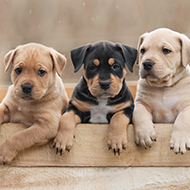The government is to reduce the number of pets that can travel under pet travel rules.
New legislation will restrict dog imports on welfare grounds
New measures to crack down on puppy smuggling are set to come into force under new legislation introduced in Parliament today (8 June).
The Animal Welfare (Kept Animals) Bill aims to raise animal welfare standards for pets, farmed and kept wild animals in five key areas, including puppy smuggling, live exports, banning keeping primates as pets, livestock worrying and zoos.
It comes after the government announced in May that it was going to formally recognise animals as sentient beings through the Animal Welfare (Sentience) Bill.
Environment secretary George Eustice said: “The Kept Animals Bill will bring in some of the world’s highest and strongest protections for pets, livestock and kept wild animals. As an independent nation outside the EU, we are now able to go further than ever on animal welfare by banning the export of live animal exports for slaughter and fattening, prohibiting keeping primates as pets and bringing in new powers to tackle puppy smuggling.”
The Animal Welfare (Kept Animals) Bill aims to raise standards in the following areas:
Puppy smuggling: The government will introduce new powers to tackle the unethical trade of puppy smuggling by reducing the number of pets (dogs, cats and ferrets) that can travel under pet travel rules. It will also include powers for the government to bring in further restrictions on the movement of pets on welfare grounds, for example by increasing the minimum age of imported puppies and restricting the import of pregnant dogs and dogs with mutilations such as cropped ears and tails.
The Animal Live exports: Live animals can endure excessively long journeys during export, causing distress and injury. EU rules prevented any changes to these journeys, but the UK government is now free to pursue plans which would see a ban on the export of live animals for slaughter and fattening. It will see the UK become the first European country to end this practice.
Banning keeping primates as pets: Primates are highly intelligent animals with complex needs and require specialist care. The government will introduce a ban on keeping them as pets, ensuring that all primates being kept privately in England are being kept at zoo-level standards and that those unable to meet the standards are phased out.
Livestock worrying: The Bill will give new powers to the police to provide greater protection to livestock from dangerous and out of control dogs. The Bill will also extend this protection to other species such as llamas, ostriches and game birds.
Zoos: The Zoo Licensing Act will be amended to improve zoo regulations and ensure that zoos are doing more to contribute to conservation.
Under its Action Plan for Animal Welfare, the government has also pledged to announce a series of further reforms this year related to microchipping, pet theft, farm animal welfare and tackling wildlife crime, as set out in its Action Plan for Animal Welfare.
Welcoming the action on illegal puppy smuggling, BVA president James Russell, said: “Every day veterinary practices see the devastating consequences of illegal pet smuggling. Puppies that have been poorly bred and taken away from their mothers at a very young age often suffer from disease, other health problems, and poor socialisation leading to heartache and financial costs for new owners. We welcome changes to the law that will stop criminal gangs abusing pet travel rules for profit.”
Dogs Trust chief executive, Owen Sharp, added: “We are thrilled to see the commitments being made by the Government in the Kept Animals Bill and are hopeful for the impact the bill could make to dog welfare. We are particularly encouraged by the measures set out to crack down on puppy smuggling, an issue we have been campaigning on for over six years."








